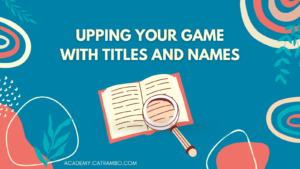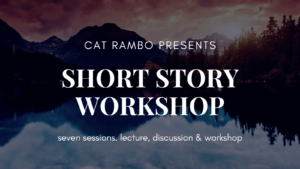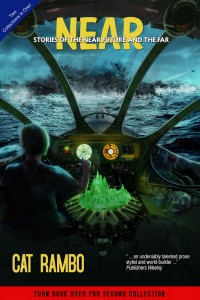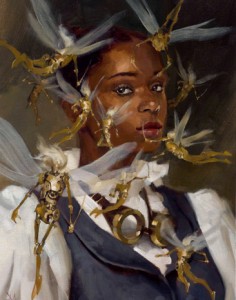Have you ever read dialogue like this?
   “We’ll need the Spear of Glorgon to kill the Pit-Fiend Czhnarboth.â€
   “Yes, we will. Do you know where the Spear of Glorgon may be found?â€
   “Sadly, it was lost centuries ago in the Empire of Cardel.â€
   “Then finding it will be the ultimate test of our powers.â€
   “True, and surely the gods of light will favor us.â€

One of the most common reasons dialogue gets boring is that it turns into a type of conversational ping-pong. Speakers volley lines of speech back and forth at each other. Each serve is neatly and appropriately returned. You’ve probably played a game or two of ping-pong like that yourself.
Think about the first time you ever picked up a paddle (in my mind, you’re in your uncle’s shag-carpeted basement.) You’re immensely proud of yourself for just getting it back and forth over the net. But it is also, effectively, a kind of stalemate—the ball goes back and forth, but nothing changes. And, after a while, it’s boring.
But a professional game of ping-pong, when you watch talented, competitive players? Not boring at all. After talking to ping-pong players and reading about the game, I think I know one reason why.
More than once I’ve come across the phrase “ping-pong is a game of spin.†If volleying the ball back and forth is the beginner level, then spin is at the heart of competitive ping-pong. It alters the movement of the ball so that the predictable becomes unpredictable. It’s what makes play volatile, explosive, unexpected—interesting.
Spin has the same effect in dialogue. It’s basically what it sounds like: a turn, a twist, a deviation.
The problem with ping-pong dialogue is that it’s so predictable: everyone stays on topic, everyone responds to the questions they’re asked, everyone provides accurate information. Dialogue with spin, in contrast, goes in unexpected directions. Since one of the reasons readers read is because they want to know the answer to a question, dialogue with spin draws readers into a story by raising (and partially answering) new questions.
How do you generate spin? A few ways, actually. Let me offer you three.
Give your characters an agenda.
When each character in a conversation has an agenda, it means that they have a goal—and, since you’re a talented writer and you have conflict bred in your bones, you know that these characters have different goals. Those goals help produce spin as each character attempts to steer the conversation toward their desired end. If, for example, you are working on dialogue between an exhausted detective and an amorous witness, you might have a great deal of fun as their competing agendas inflect their conversation in different ways.
Allow for subtext.
While subtext often naturally arises from giving characters an agenda, the two are not interchangeable.
Subtext is the text around and behind and between the words—the text that never makes it into text. When a character says exactly what they want, you’re dealing with on-the-nose dialogue, which is the clinical condition of having zero subtext. Subtext is about hidden meanings, unverbalized desires, buried insults.
To extend the example above, let’s imagine that our amorous witness is married and can’t directly proposition the detective. The spoken conversation might be exclusively about the crime, while the subtext might be the unspoken thrust-and-parry of an attempted seduction.
Employ “No†Dialogue.
I find this technique to be a great deal of fun. It’s exactly what it sounds like—one character wants something, and the other refuses to give it to them. The fun comes in finding ways to make the refusals—and there should be a number of them—indirect and distinct, without the character repeating themself. Often, this becomes part of both the competing agenda and the subtext; the three work together beautifully. In our example, perhaps the amorous witness is also the police chief’s romantic partner, and the detective’s refusals must be firm but indirect enough not to humiliate and enrage the witness.
Bonus technique: Third-ball Attack
To wrap-up our ping-pong analogy, I’d like to offer you one more idea: the third-ball attack. In ping-pong, this refers to a strategy that goes like this: Player A serves the ball (ball #1), Player B returns it (ball #2), and Player A attacks (ball #3).
Think of this as both a heuristic—a rule-of-thumb diagnostic—and as a technique. If you’re writing dialogue, and you can tell it’s starting to drag, look at the first three lines. If the first three lines are ping-pong dialogue, the likelihood is that the rest of the conversation is, too.
You can break it up by turning that third line into an attack: give the dialogue stakes no later than the third line. One character makes a difficult request, issues an ultimatum, attempts a threat, initiates a seduction—whatever it is, it has to commit them to a risky course of action so that, succeed or fail, there are consequences.
Final Considerations
Is the sky the limit with spin? Not exactly. There’s a point of diminishing returns, even a point where it becomes counterproductive. Too much spin produces conversations that are hard to follow (whether because of non sequiturs, or because they break genre conventions, or because they become illogical or incomprehensible). These all threaten to alienate the reader. More spin is not necessarily better.
The important things to remember? Ping-pong bad. Spin good. If nothing’s happening, third-ball attack. And remember, just like real people, fictional characters are rarely as good at communicating as they think they are.
What kind of dialogue bores you to sleep? What are your go-to strategies for pepping it up? Who writes your favorite dialogue? Share some examples and tell us why!
Want to improve your dialogue even more? In January 2023, Gregory will be teaching the Odyssey Online class, Angled Dialogue: Crafting Authentic-Sounding Dialogue to Convey Information, Escalate Conflict, and Advance Character-Driven Stories.
Odyssey Online classes combine deep focus, directed study, intensive practice, and detailed feedback to help students learn how to best use the tools and techniques covered to make major improvements in their fiction.
Apply by November 21 at odysseyworkshop.org!
BIO

Gregory Ashe is a bestselling author and longtime Midwesterner. He has lived in Chicago, Bloomington (IN), and Saint Louis, his current home. He primarily writes contemporary mysteries, with forays into romance, fantasy, and horror. Predominantly, his stories feature LGBTQ protagonists. When not reading and writing, he is an educator. He is a graduate of the Odyssey workshop and has returned to teach there. For more information, visit his website: www.gregoryashe.com.
 Hello! Time is slipping away on 2022, and I’m running the annual holiday sale on on-demand classes, where they are $5 each. Or you can grab all 21 classes on offer for $100. This offer is only good through January 2, 2023! (Some classes are going up in price next year, so snag them now!)
Hello! Time is slipping away on 2022, and I’m running the annual holiday sale on on-demand classes, where they are $5 each. Or you can grab all 21 classes on offer for $100. This offer is only good through January 2, 2023! (Some classes are going up in price next year, so snag them now!)


 Every culture tells stories. We keep our history alive this way. We all have rituals, whether they are secular or deeply religious. When you’re worldbuilding, you can communicate a plethora of culture and history through the traditions and festivals your characters observe.
Every culture tells stories. We keep our history alive this way. We all have rituals, whether they are secular or deeply religious. When you’re worldbuilding, you can communicate a plethora of culture and history through the traditions and festivals your characters observe. While I am a sucker for fairytales and magic, one area of writing that I persistently search for is dystopian not-so-distant futuristic novels. Something plausible, and terrifying, that engulfs the reader in the imaginative, but hope-it-won’t-happen world characters live in.
While I am a sucker for fairytales and magic, one area of writing that I persistently search for is dystopian not-so-distant futuristic novels. Something plausible, and terrifying, that engulfs the reader in the imaginative, but hope-it-won’t-happen world characters live in. Erin Carrougher lives in the Seattle area and was more than suited to write about the region as the location of her dystopian novel. She has a passion for storytelling and loves to envision worlds other than our own. Carrougher minored in Creative Writing and currently works as a Sales Manager, and enjoys cooking and the outdoors. Augland is Carrougher’s first novel.
Erin Carrougher lives in the Seattle area and was more than suited to write about the region as the location of her dystopian novel. She has a passion for storytelling and loves to envision worlds other than our own. Carrougher minored in Creative Writing and currently works as a Sales Manager, and enjoys cooking and the outdoors. Augland is Carrougher’s first novel.

 Hello! While most years I compile a page of award eligibility posts, this year I’m going to be on the road in November, and adding that responsiblity to everything else I’m doing that month seems a little crazypants. So if you’ve got an award eligibility post, I invite (and encourage) you to drop a link to it in the comments here!
Hello! While most years I compile a page of award eligibility posts, this year I’m going to be on the road in November, and adding that responsiblity to everything else I’m doing that month seems a little crazypants. So if you’ve got an award eligibility post, I invite (and encourage) you to drop a link to it in the comments here! Fixing the Broken Story – Sometimes you know a story isn’t working, but you don’t know why. Identifying gaps and structural problems is the first step to fixing them. In this workshop you will learn techniques for identifying what’s missing in a story and then fixing the problem through a mixture of lecture, discussion, and in-class exercises.
Fixing the Broken Story – Sometimes you know a story isn’t working, but you don’t know why. Identifying gaps and structural problems is the first step to fixing them. In this workshop you will learn techniques for identifying what’s missing in a story and then fixing the problem through a mixture of lecture, discussion, and in-class exercises. Follow the Money: Worldbuilding and Economics – Far too often, writers don’t consider the economic underpinnings of the world in which they’re working. But factoring in finances can yield new story ideas as well as plot twists and turns, rich world-building details, and insight into character and motivation. How do you use economics to create not more sensible worlds — but more interesting ones?
Follow the Money: Worldbuilding and Economics – Far too often, writers don’t consider the economic underpinnings of the world in which they’re working. But factoring in finances can yield new story ideas as well as plot twists and turns, rich world-building details, and insight into character and motivation. How do you use economics to create not more sensible worlds — but more interesting ones? Upping Your Game with Titles and Names – A killer title can be the chef’s kiss atop an awesome story, or the flashy lure that pulls your reader in. How do you come up with that title and that takes your fiction even further? And names matter inside a story too: your character usually has nicknames, aliases, titles, and more. How can you use this to flesh out both your world and your character? Join Cat Rambo for a mix of lecture, discussion, and writing tips and exercises designed to have you thinking in new ways about names and titles as well as coming away with plenty of techniques and inspiration for future use.
Upping Your Game with Titles and Names – A killer title can be the chef’s kiss atop an awesome story, or the flashy lure that pulls your reader in. How do you come up with that title and that takes your fiction even further? And names matter inside a story too: your character usually has nicknames, aliases, titles, and more. How can you use this to flesh out both your world and your character? Join Cat Rambo for a mix of lecture, discussion, and writing tips and exercises designed to have you thinking in new ways about names and titles as well as coming away with plenty of techniques and inspiration for future use. This is the workshop I give every couple of years; I will not be giving it in 2023. There will be
This is the workshop I give every couple of years; I will not be giving it in 2023. There will be  Whenever I ask the question “How shall I live?†I always look to literature for the answer. But this time the answer came in a dream.
Whenever I ask the question “How shall I live?†I always look to literature for the answer. But this time the answer came in a dream.



